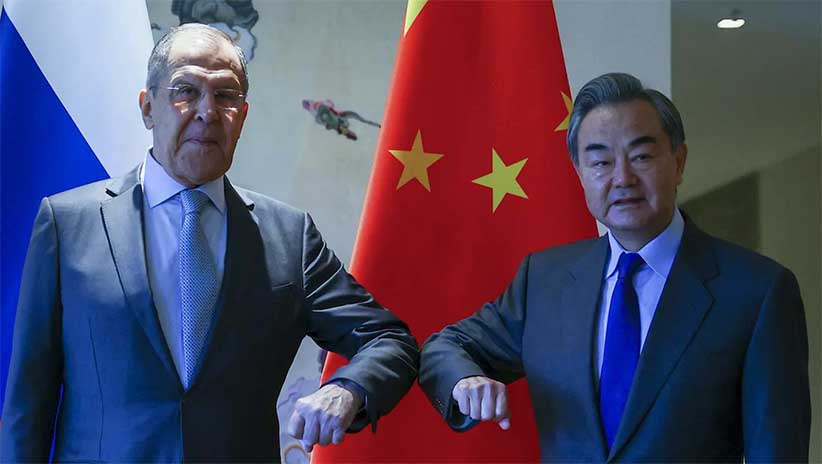Russian Foreign Minister Sergey Lavrov with Chinese Foreign Minister Wang Yi, Beijing, March 23, 2021
When Pepe Escobar has a column to fill but his content, though important, could be expressed in a few words, he can come across as overblown. Fortunately, most of the time he has too few words at his disposal, not too many.
Most of the time I never want his pieces to end. And even when he is labouring a point, it’s not that the point lacks substance. His ICH piece of July 31 – Requiem for an Empire: A Prequel – is a good example but I’ve done the heavy sifting for those pushed for time. Here, abridged, is the critical bit:
China has begun telling the US Empire, “That’s enough”. It started two months ago when the formidable Yang Jiechi 1 made shark fin’s soup of the helpless American delegation. The piece de resistance came this week in Tianjin, where Vice Foreign Minister Xie Feng and his boss Wang Yi reduced mediocre imperial bureaucrat Wendy Sherman to stale dumpling status.
(Mr Escobar, as you see, is given to vivid metaphor. Not all his gems are culinary.)
This searing analysis 2 by a Chinese think tank reviewed all the key issues. Here are the highlights.
- The Americans wanted “guardrails and boundaries” to avoid a deterioration of US-China relations and “manage” them responsibly. That did not work, because their approach was “terrible”.
- Vice Foreign Minister Xie Feng called “competition, cooperation and confrontation” a US “blindfold” to contain and suppress China. The US demands cooperation when it needs China, but where it sees advantage it decouples and cuts off supplies, blocks and sanctions, and will clash and confront China in order to contain it.
- Xie Feng presented two lists to the US delegation. A list of 16 items asks the US to correct its wrong policies toward China. A list of 10 items prioritises causes of China’s concern: “if these anti-China issues are not resolved, what is there to talk about?”
- And then, the sorbet to go with the cheesecake: Wang Yi’s three bottom lines to DC:
-
- “The US must not challenge, denigrate or attempt to subvert the socialist road and system with Chinese characteristics. They are the choice of its people, and concern their long-term welfare and the future destiny of the Chinese nation.”
- “The US must not obstruct or interrupt China’s development. The Chinese people have the right to a better life, and China has the right to modernize. This is not the monopoly of the US and involves the basic conscience of mankind and international justice. China urges the US to lift all unilateral sanctions, high tariffs, long-arm jurisdiction and the science and technology blockade imposed on China.”
- “The US must not infringe on China’s sovereignty, let alone undermine China’s territorial integrity. The issues related to Xinjiang, Tibet and Hong Kong are never about human rights or democracy, but about the major rights and wrongs of fighting against “Xinjiang independence”, “Tibet independence” and “Hong Kong independence”. No country will allow its sovereign security to be compromised. As for Taiwan, it is a top priority. If ‘Taiwan independence’ dares to provoke, China has the right to take any means needed to stop it.”
Will Washington register the above? Of course not. But what matters is the realpolitik. The point has been made: China has had enough of American arrogance, and the time when the US could bully the Chinese is long gone.
*
- Yang Jiechi, former foreign secretary and one of China’s most senior politicians, was mentioned briefly in the first of my 3 China reads in April: “Obama’s 2011/12 pivot to Asia was continued under Trump and, as Blinken’s Alaska hectoring of Yang Jiechi made clear, will continue under Joe Biden too.”
- Unfortunately the linked ‘searing analysis’ is in Mandarin. Anyone out there care to translate?

